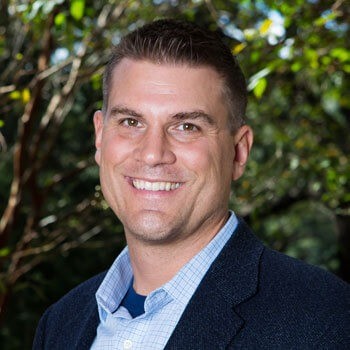
Joseph M. Currier, Ph.D.
Dr. Currier will be reviewing applications for the SPiRIT Lab for the 2024-25 academic year.
Education
APA Accredited Post-Doctoral Fellowship, Polytrauma and Returning Veterans (OEF/OIF) Program, Memphis VA Medical Center, Memphis TN
APA Accredited Clinical Psychology Internship, Memphis VA Medical Center, Memphis TN
Ph.D Clinical Psychology, University of Memphis, Memphis TN
M.A. Clinical Psychology, Wheaton College, Wheaton IL
B.A. Psychology and Catholic Studies, University of St. Thomas, St. Paul MN
Research Interests
My research broadly focuses on the multifaceted role of spirituality and religion (S/R) in coping with traumatic events and other mental health challenges. Along with graduate and undergraduate students, our Spirituality in Psychological Research, Intervention, and Training (SPiRIT) Lab generally pursues two types of studies: (1) basic research studies that examine pathways or processes via which S/R can promote resilience, cause psychological suffering, and/or influence the etiology, phenomenology, and healing of PTSD, moral injury, and other clinical problems; and (2) translational research studies that will lead to ethical and effective strategies for routinely addressing S/R in clinical training and practice. We rely on diverse scientific methods to achieve these goals, including mixed methods, longitudinal surveys, practice-based evidence research, meta-analysis, experience sampling, and community participatory action research. We also regularly collaborate with colleagues from psychology and other healthcare fields (including chaplaincy), community partners and organizations, and funders who make our work possible.
Recent Projects
Lectio Divina Project: Lectio divina (latin for divine reading) is an ancient Christian practice of contemplative
prayer with four steps or movements: reading sacred scripture (lectio), reflecting
and savoring what is read (meditatio), listening and responding prayerfully to God
and the revelations have for one's life (oratio), and awareness and resting in God’s
presence (contemplatio). In partnership with colleagues from Stetson University, Ohio
State University, and Contemplative Outreach, we will undertake a sequential-explanatory
project involving: (1) cross-sectional surveys to explore variations and associated
outcomes of lectio divina in experienced practitioners’ everyday lives; (2) an ecological
momentary assessment (EMA) study that will elucidate antecedents, microprocesses,
and proximal outcomes of the four steps and practice as a whole; (3) a dismantling
RCT that will assess the distinct value of the single apophatic element of the practice
(contemplatio); (4) and qualitative investigations that will further reveal dynamics
and probable benefits of contemplation and the three kataphatic elements. In tandem,
the sequence of these studies will advance scientific research and possible clinical,
ministry, and other applications of lectio divina that may enhance human flourishing
across spiritual, psychological, existential, and physiological domains.
Divine Forgiveness Project: In partnership with colleagues from Wheaton College, University of Central Florida,
and Florida State University, this project seeks to illumine the nature, expressions,
and functions of divine forgiveness (DF) in theistic relational spirituality across
three phases. In Phase 1, we will conduct an online survey assessing DF, religious
attachment, and other psychospiritual factors. In Phase 2, we will examine the reciprocal
interplay between DF and indices of psychospiritual functioning (e.g., positive and
negative emotion, moral struggles, self-compassion) in a representative group of survey
respondents via an ecological momentary assessment approach. In Phase 3, participants
will complete an adapted version of the Religious Attachment Interview that has been
designed to examine how individual differences in religious attachment might influence
perceptions and experiences of DF.
Spiritual and Religious Competencies Project: In partnership with psychology, counseling, and social work colleagues from five
universities, the project seeks to promote research and training in spiritual and
religious (S/R) competencies via micro-, mezzo-and macro-level objectives across four
initiatives: (1) develop, implement, evaluate, and disseminate an integrated curricular
approach to infusing training in S/R competencies into graduate coursework; (2) produce
resources/tools for assessing and addressing S/R competencies in clinical training
settings; (3) conduct a national, inter-disciplinary survey of graduate faculty to
understand faculty views, experiences, and perceived barriers/supports to training
their students in S/R competencies; and (4) coordinate a set of systems-level change
activities to identify/remove barriers and promote widespread integration of S/R competencies
in mental health training, research, and practice.
Recent Publications
Currier, J. M. Pearce, M. J., Wong, S., Salcone, S., Brock, B., Kim, E., Kemp, D., Hinkel, H., Oxhandler, H. K., Vieten, C., Fox, J., Polson, C., & Pargament, K. I. (in press). Acceptability and feasibility of infusing training in spiritual and religious competencies in mental health graduate education. Training and Education in Professional Psychology.
Pearce, M. J., Pargament, K. I., Wong, S., Hinkel, H., Salcone, S., Morgan, G., Kemp, D., Brock, B., Kim, E., Oxhandler, H. K., Vieten, C., Fox, J., Polson, C., & Currier, J. M. (2024). Enhancing training in spiritual and religious competencies in mental health graduate education: Evaluation of an integrated curricular approach. PLOS ONE. 19(9): e0306114.
Currier, J. M., Swift, J., Sanders, P., & Richards, P. S. (2024). Preventing dropout in spiritually integrated psychotherapies: What are effective methods of attending to clients’ spirituality? Psychotherapy. Advance online publication.
Currier. J. M., Bounds, E. M., Matsuo, H., Abernethy, A. D., Witvliet, C. V., VanHarn, K., Root Luna, L., Foster, J. D., & Schnitker, S. A. (2024). Temporal associations between meaning in life, ultimate meaning struggles, and mental health outcomes in a spiritually integrated inpatient program. Journal of Clinical Psychology. Advance online publication.
Currier, J. M., McDermott, R. C., Sanders, P., Barkham, M., Owen, J., Saxon, D., & Richards, P. S. (2024). Practice-based evidence for spiritually integrated psychotherapies: Examining trajectories of psychological and spiritual distress. Journal of Counseling Psychology. Advanced online publication.
Currier, J. M., McDermott, R. C., Fernandez, P., Salcone, S., Hinkel H. M., Schuler, K., Fadoir, N., & Smith, P. N. (2024). Examining the outcomes and acceptability of a peer-led spiritual intervention for moral injury in a Veteran Service Organization. Psychological Services, 21, 276-286.


